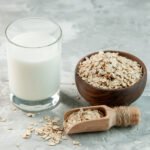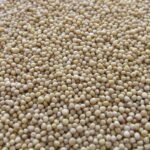Whoosh! There goes your cake, rising to perfection in the oven. And to whom do we owe this magic? Baking powder, of course! This unsung hero in your kitchen might seem insignificant, but without it, your cakes and cookies would be as flat as a pancake. But have you ever stopped to ponder the origin of this miracle worker, or the different forms it comes in, or even its nutritional benefits? If not, now’s your chance. Buckle up, folks, as we delve deep into the fascinating world of baking powder.
A Sprinkle of History: Where Does Baking Powder Come From?
Like many of the best things in life, baking powder has its roots in good ol’ experimentation. In the early 19th century, bakers were wrestling with the issue of how to make their bread and cakes rise uniformly. Then along came a chemist named Alfred Bird, who first developed an early form of baking powder. He wanted to create yeast-free bread for his wife, who was allergic to yeast, and boy, did he deliver!
The formula has been tweaked over the years, but the core principle remains the same. It’s now a staple in kitchens across the globe, ensuring our baked goods are fluffy and delicious.
It’s All in the Mix: Types of Baking Powder
Now, here’s where it gets a tad complicated. Not all baking powders are created equal. There are actually two main types:
- Single-Acting Baking Powder: This type reacts and creates gas bubbles when it gets wet. That’s why you need to pop your batter in the oven ASAP when using it.
- Double-Acting Baking Powder: This one is a real game changer. It creates gas bubbles twice—once when it gets wet and again when it’s heated. This gives your baked goods an extra lift, making them lighter and fluffier.

So next time you’re perusing the baking aisle, you’ll know what’s what.
Under the Microscope: Nutritional Benefits of Baking Powder
You might be wondering, “Does baking powder have any nutritional benefits?” The short answer is: kind of. While it’s not exactly a superfood, it does contain some minerals due to its makeup. But given the small amount used in recipes, these benefits are minimal.
Let’s check out a table showcasing baking powder’s nutritional values:
| Nutrient | Amount per 100g |
|---|---|
| Calories | 53 |
| Sodium | 10,630mg |
| Potassium | 365mg |
| Calcium | 2,230mg |
FAQs About Baking Powder
Can I substitute baking soda for baking powder?
Not quite! While they’re often confused, baking soda and baking powder aren’t the same thing. Baking soda is much stronger, and it requires an acidic ingredient to activate it. If you’re in a pinch, you can make your own baking powder with baking soda and cream of tartar.
Does baking powder have gluten?
No siree! Baking powder is naturally gluten-free. However, if you’re extremely sensitive to gluten, you should check the label to make sure it wasn’t processed in a facility that also processes gluten-containing foods.
How long does baking powder last?
Generally, baking powder can last up to a year if stored properly. But if you’re not sure, you can do a quick test by mixing a teaspoon of it with 1/3 cup of hot water. If it bubbles vigorously, it’s still good to go!
Final Thoughts: The Rising Star in Your Kitchen
As we wrap things up, it’s clear to see that baking powder is a real lifesaver in the kitchen. Without it, our baked goods would lack the light, fluffy texture we all know and love. So, the next time you’re whipping up a batch of cookies or a delicious cake, give a nod to the magic that is baking powder!
After all, it’s what’s on the inside (of your baked goods) that counts, right?
Fun Facts About Baking Powder
- The first commercial baking powder was marketed in 1850 by the English food manufacturer Alfred Bird.
- Baking powder is a staple ingredient in astronaut food due to its long shelf life and versatility.
- The world record for the tallest baking powder biscuit is 2.79 feet, set by a bakery in Stratford-upon-Avon, UK, in 2019.
Source: USDA National Nutrient Database




